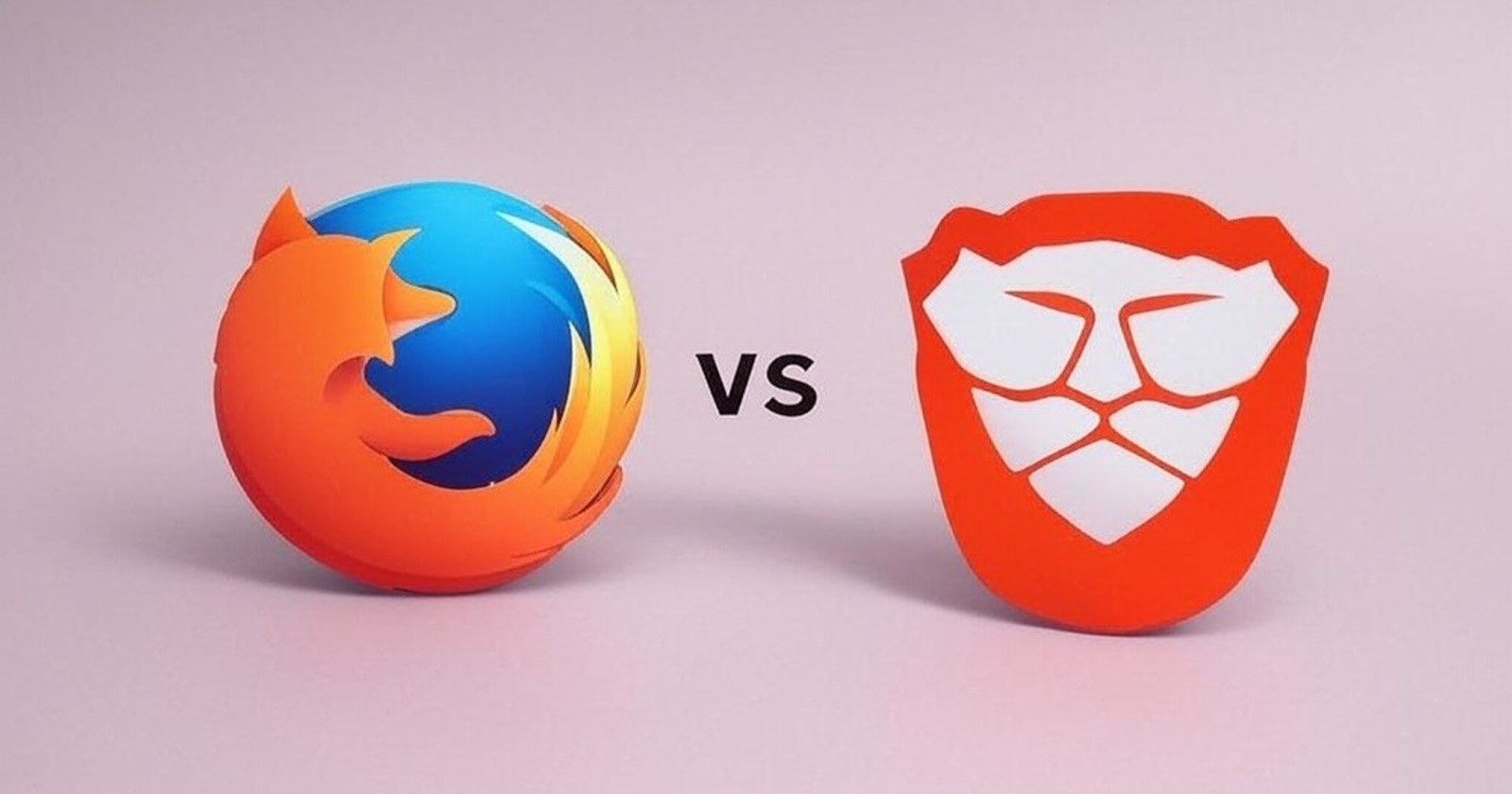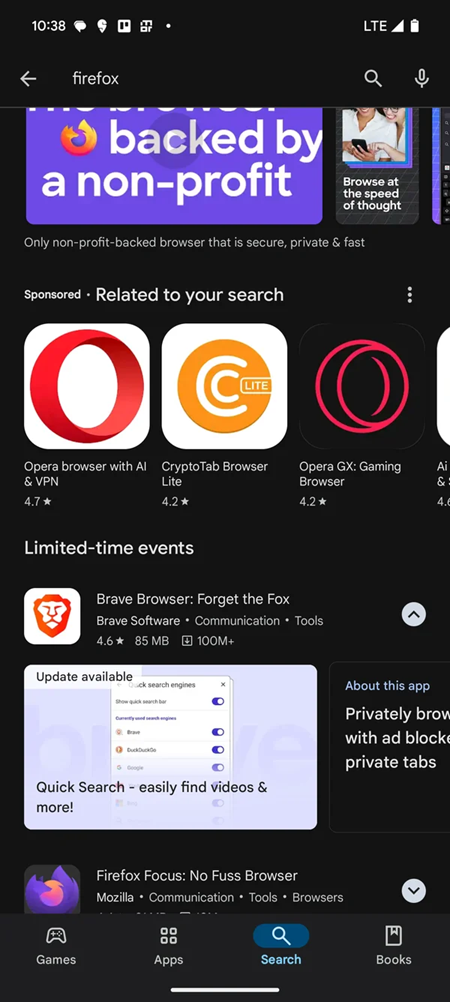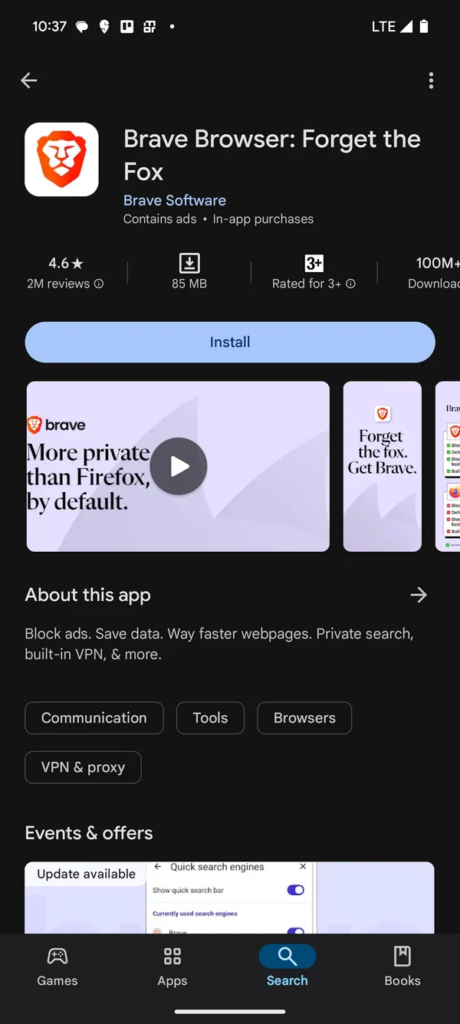This is some severe mental gymnastics from charlatans at the Firefox propaganda dept with this one.
— LukΞ Mulks 🦁⟁◎⟁ (@lukemulks) October 30, 2024
Let's unpack this nonsense.
🧵https://t.co/zdLtpgtKrP pic.twitter.com/N1kyWvzuCj
The internet loves a good rivalry, and in the world of web browsers, the ongoing spat between Firefox and Brave is turning into a full-blown soap opera. The latest twist? Brave briefly rebranded itself in the Google Play Store with the tagline “Forget the Fox” — a not-so-subtle jab at Firefox browser. When searching for Firefox in the Play Store, the results included the option to download “Brave Browser – Forget the Fox.” Firefox responded on X with a simple “Imagine hating on us when we’re literally just minding our own business and browsing the web 🙃.” But then, like a glitch in the matrix, the tagline was gone from the Play Store.
Now, here’s where things get interesting. Luke Mulks, VP of Business Operations at Brave, took to X to claim that the “Forget the Fox” tag was nothing more than a photoshopped meme. He laughed it off, dismissing the whole thing as an internet joke.
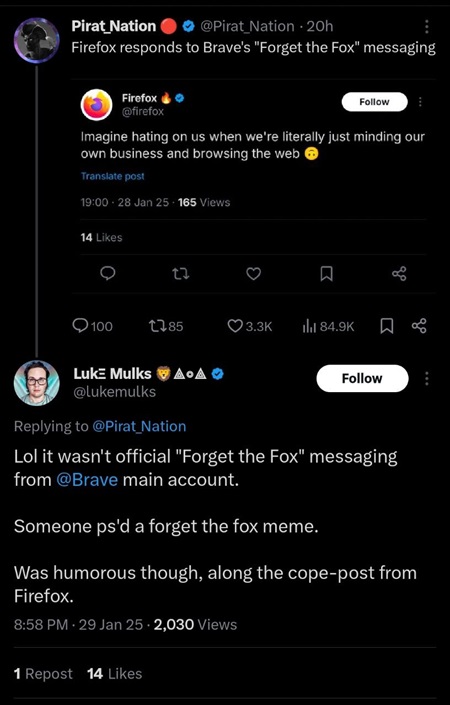
But my boss — an eyewitness to the digital drama — categorically confirms he saw the name change in real-time and even took a screenshot before it mysteriously disappeared the next day. So, either we’re all living in a mass hallucination, or Brave is trying to quietly sweep this one under the rug. Even more intriguing, a few other users have come forward claiming they saw the same thing. So, what’s really going on here?
Below are a couple of screenshots my boss took from the Google Play Store.
Mulks claiming the entire ad campaign is fak raises a couple of possibilities, none of which paint Brave in a particularly flattering light:
- The VP of Brave is being honest but doesn’t know what the marketing department is doing. If this is the case, it suggests a serious lack of internal communication at Brave. How does the VP of Business Operations not know what’s happening with the company’s Play Store listing? It makes Brave look disorganized, if not outright incompetent.
- The VP of Brave is lying. If Mulks is aware of the campaign and is now trying to cover it up, that’s a whole different can of worms. It would mean Brave is willing to mislead its users and the public, which is a terrible look for a company that prides itself on transparency and privacy.
Regardless of which scenario is true, the whole situation is a PR mess for Brave. Either they’re disorganized, dishonest, or the victim of an elaborate hoax — and none of those options are great.
A history of browser beef
This isn’t the first time Firefox and Brave have locked horns. The two browsers have been engaged in a passive-aggressive PR battle for quite sometime, each touting their privacy credentials while subtly (or not-so-subtly) throwing shade at the other.
Let’s rewind to 2020, when Mozilla’s comparison page for Brave was a model of civility. The page acknowledged Brave’s strengths, praised its privacy features, and even gave a nod to its innovative (if controversial) Basic Attention Token (BAT) system. Fast forward to 2024, Brave published its own comparison page highlighting Firefox’s “limited” protection against third-party cookies and its reliance on Google Search for revenue. Brave’s page also touted its independent search engine and superior privacy protections, complete with a handy chart full of checkmarks for Brave and none or a few for Firefox.
Not to be outdone, Mozilla fired back with a dramatically reworked comparison page, shifting from “here’s how we both help protect privacy” to “Brave is broken, and we’re better.” One standout claim was that “Brave’s default ad blocking may break the websites you visit,” an assertion that felt more like an attack than a comparison. The updated page reads less like a comparison and more like a takedown, with Firefox accusing Brave of breaking websites with its aggressive ad-blocking and failing to password-protect saved passwords.
Mozilla’s updated page didn’t sit well with Brave’s Luke Mulks, who went on a full-fledged rant on X. In a thread, Mulks accused Firefox of “mental gymnastics,” “privacy dilution,” and peddling “FUD, lies, misattribution, and bullshittery by omission.” He even dragged Mozilla’s declining market share into the fray, pointing out that Brave’s monthly active users have grown from 30 million in 2022 to over 80 million in 2024. He accused Mozilla’s “propaganda department” of peddling nonsense and took issue with their “privacy settings are strong and easy to use” claim. According to Mulks, Firefox’s default privacy protections don’t hold up under scrutiny.
He also clapped back at Mozilla’s criticism of Brave’s search engine, pointing out that Firefox makes Google its default search provider (and gets paid handsomely for it), whereas Brave uses its own independent, privacy-focused search engine. “This = a Feature, not a Bug,” he declared, roasting Mozilla for feeding user data to Google.
Firefox, for its part, has remained relatively quiet on social media, letting its updated comparison page do the talking. But the message is clear: Firefox believes Brave’s approach to privacy is too aggressive and inconvenient, while Brave sees Firefox as a relic of the past, propped up by Google’s ad revenue.
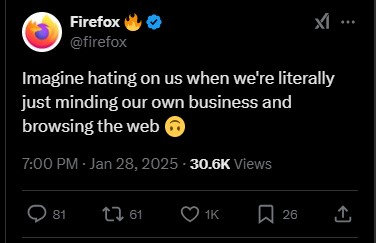
What’s really going on here?
At its core, this feud is about more than just browsers — it’s a clash of philosophies. Firefox, with its long history and commitment to open-source principles, represents the old guard of the internet. Brave, with its crypto-powered rewards system and aggressive privacy defaults, is the disruptor, challenging the status quo and pushing the envelope on what a browser can be.
But let’s be real: it’s also about market share. With Chrome dominating the browser landscape, both Firefox and Brave are fighting for a slice of the pie. And in the battle for users, every dig, every comparison chart, and every Play Store tagline matters.
Which brings us back to the whole “Forget the Fox” Play Store saga. If this was indeed a photoshopped meme, then why did multiple users — including my boss — see it live on Google Play? The timing is also suspicious, coming right on the heels of Firefox’s aggressive rebranding against Brave. Could this have been an A/B test that Brave quickly rolled back? Or a bold marketing experiment they later regretted? We might never get an official answer.
In the end, the real winners here are the users. Competition drives innovation, and both Firefox and Brave are pushing each other to be better. Whether you prefer Firefox’s simplicity or Brave’s boldness, that’s up to you.
As for the “Forget the Fox” tag? Whether it was a meme, a glitch, a marketing stunt, or an internal miscommunication, it’s already cemented its place in browser lore. And honestly, we’re here for it.
So, which side are you on? Team Firefox or Team Brave? Let the debate begin.
TechIssuesToday primarily focuses on publishing 'breaking' or 'exclusive' tech news. This means, we are usually the first news website on the whole Internet to highlight the topics we cover daily. So far, our stories have been picked up by many mainstream technology publications like The Verge, Macrumors, Forbes, etc. To know more, head here.

